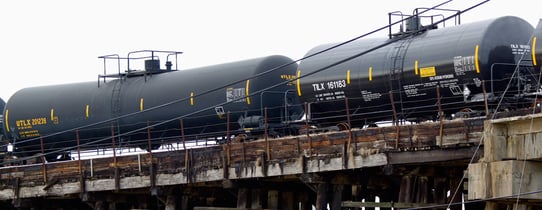A sizeable portion of the country’s bulk freight transport occurs, for at least part of the journey, on railcars and barges. And while these are efficient and cost-effective modes of transport, they are susceptible to freight delays. In this article, we’ll look at preparation that you can undertake as a shipper to minimize the impact to your supply chain should a delay occur.
Bulk freight delays on rail and river
The events of 2022 have thrust rail and barge delays from the pages of industry publications to the Wall Street Journal. Most notably, the nation recently avoided a rail strike that would have cost Americans an estimated $2 billion per day.
At the same time, the Mississippi River has experienced water levels that are at or near historic lows. This has caused severe backups on the river as barges are unable to move. Unlike the narrowly-averted rail strike, this is a problem that barges on the Mississippi – and other US rivers – may be dealing with for some time.
These are just a few of the more high-profile freight delays that the nation’s shippers have experienced recently. But rail and barge delays are a relatively common occurrence, especially those caused by weather events like hurricanes, flooding, ice and snow.
When a rail or barge delay occurs
 When a rail or barge interruption occurs, your first option is to simply wait for service to be restored. Depending on the severity of the interruption and the location where it occurred, your wait could be a long one. Let’s take a rail service disruption caused by a hurricane, for example. You’ll have to wait for the storm to pass, for flooding (if any) to subside, and for the tracks to be cleared. You’ll then need to wait for the railcars to be inspected for damage and either cleared for return to service or replaced, all of which can take quite a while. In short, if the products handled by your rail operation can’t afford to be offline for several days or even a week or more, then waiting isn’t your best option.
When a rail or barge interruption occurs, your first option is to simply wait for service to be restored. Depending on the severity of the interruption and the location where it occurred, your wait could be a long one. Let’s take a rail service disruption caused by a hurricane, for example. You’ll have to wait for the storm to pass, for flooding (if any) to subside, and for the tracks to be cleared. You’ll then need to wait for the railcars to be inspected for damage and either cleared for return to service or replaced, all of which can take quite a while. In short, if the products handled by your rail operation can’t afford to be offline for several days or even a week or more, then waiting isn’t your best option.
Your next option is to have trucks fill in the gap caused by the interruption. Liquid or dry bulk trucks can receive your loads from the railcars and make their way to your destination(s). This is an attractive option that can get your bulk shipping operation back in motion quickly. There are a few key considerations, however:
- Cost. Just as 1 railcar can carry the equivalent of about 4 trucks, the cost of those 4 trucks is going to be much higher than the cost of 1 railcar. Depending on the cause of the rail interruption, however, you may be reimbursed by the rail provider – making the cost of trucks largely a non-issue. When such reimbursement is not a possibility, some companies try to wait it out rather than pay for the necessary trucks, which brings us to…
- Capacity. In this tight-capacity market, trucks are busy. They’re constantly in motion – not waiting for the phone to ring. Because of this, securing capacity can be a challenge. It becomes much more of a challenge if you try waiting out the interruption until your operation reaches a crisis point where trucks are needed immediately.
5 ways to prepare your supply chain for delays
While some interruptions like a potential rail strike will come with a little bit of warning, others like extreme weather events can happen suddenly. In either case, having a solid contingency plan in place can help you make the best out of a challenging situation. The following 5 steps can help form such a plan.
- Have a rainy-day stock on hand. The question of waiting it out or securing trucks will largely hinge on how dire the interruption’s impact is on your supply chain. If you have a “rainy-day” stock of your products in storage, you can keep your product moving – albeit in smaller volumes – until your bulk supply lines flow freely again. This makes the interruption period less dire and may allow you to wait for restoration of service a little longer.
- Have alternate product sourcing relationships in place. If a rail or barge interruption is preventing a key product component from reaching the manufacturing plant, it’s helpful to have an alternate way to source that product. Can you turn to another vendor for the product or rely on bulk trucking from your existing vendor’s other facilities to fill in the gap? The key is to have these backup plans in place before an emergency develops.
- Consider alternate modes of transportation. When your rail or barge service is interrupted, it’s important to have other types of transportation to lean on. For example, if rail service is interrupted, you may be able to transload your product onto liquid tankers or dry bulk trailers, to a barge, or into drums or totes for transport in a dry van truck. Again, the key is to understand these options and build relationships with transport providers before desperation sets in.
- Have alternate trucking options in place. As the old adage says, never put all your eggs in one basket. This is especially true when you experience a rail or barge freight delay and your go-to carrier is unable to help. You can get your eggs out of the one-carrier basket by simply establishing relationships with other carriers. Or, better yet, you can establish a relationship with hundreds of carriers by partnering with just one bulk freight broker that has a national carrier network. Such a freight partner can not only help you find bulk capacity when it’s scarce, it can also match your loads with carriers that specialize in specific lanes and keep your costs low by shopping your freight among several providers.
- Budget accordingly. Unsurprisingly, once the word “emergency” enters the equation, you can expect that your costs for getting through that emergency are going to be higher. According to the University of Illinois Department of Agricultural and Consumer Economics, “Historically barge rates have hovered around $20 per a ton. In the beginning of September, as the Mississippi River began to fall to record low levels and closures and disruptions started to mount, barge rates rapidly began increasing. The St. Louis barge spot rate hit a record $106 per ton during the week of Oct 11.”
Turn to Bulk Connection for emergency capacity during freight delays
If rail or barge delays and interruptions can negatively impact your operations, partnering with Bulk Connection can help ride out any emergency scenario. Bulk Connection has a large nationwide network of bulk freight carriers, which enables us to pull trucks from far and wide to fill in the gaps caused by your freight interruption. This network is supported by our team of bulk freight experts who average more than a decade in the industry and can use their vast knowledge and experience to keep your goods moving. To learn more about Bulk Connection’s brokerage services, contact us today.




